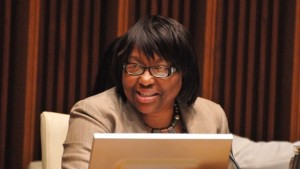 DIRECTOR of Pan American Health Organization (PAHO) Dr Carissa Etienne is prodding regional governments to maintain routine vaccination programmes amid growing COVID-19 cases, warning that faltering could lead to other disease outbreaks, resulting in health systems buckling.
DIRECTOR of Pan American Health Organization (PAHO) Dr Carissa Etienne is prodding regional governments to maintain routine vaccination programmes amid growing COVID-19 cases, warning that faltering could lead to other disease outbreaks, resulting in health systems buckling.
“This week, however, is vaccination week in the Americas; it is time to promote and celebrate the life-saving power of vaccines. And, in 2020, we approach it with an acute sense of urgency – until a vaccine for COVID-19 is available, immunisations can and must be delivered by the health services alongside the response to COVID-19,” Dr Etienne said while addressing a weekly virtual briefing hosted by PAHO yesterday.
“This is why, first we must vaccinate to protect health workers, the elderly and other vulnerable populations from other respiratory infections such as influenza and pneumococcus, which can lead to more hospitalisations and may be harder to diagnose in the context of COVID-19. Secondly, if we fall behind on routine vaccinations, particularly for children, we risk outbreaks, thus overwhelming hospitals and clinics with preventable diseases in addition to COVID-19,” she pointed out.
According to the PAHO director, were this to happen, “the impact on our health system would take months or even years to reverse”.
“This region has shown great capacity to ensure that its people are vaccinated and we must [not only] maintain this capacity now, but also…ensure the readiness to deliver the vaccine for COVID-19. History has shown us that after wars or epidemics, if we allow large gaps in immunisation coverage, vaccine-preventable diseases like polio and measles can re-emerge,” she added.
In the meantime, Dr Etienne pointed out that even though measles was eliminated in the region in 2016, as coverage rates dropped, outbreaks were seen in Brazil, Venezuela, Colombia, and in a few states in the United States.
“As we speak, at least three countries are working to contain measles outbreaks in Latin America. Efforts to contain measles must continue safely amid the COVID-19 pandemic, or we risk erasing more than 20 years of progress,” she stated.
Dr Etienne said this is true for other diseases and a top priority for PAHO, as many countries have been struggling to maintain high coverage of key vaccines even before the pandemic.
“Globally, COVID-19 has already impacted vaccination programmes [by] interrupting vaccine supply routes, reducing the availability of health workers to deliver immunisations, and hindering access to primary care services. This is a cause for alert; if we don’t immunise now, many more people are going to get sick from preventable disease in the coming months and years,” she told the briefing.
She said, in this regard, PAHO has issued detailed guidance to countries to help plan and make decisions on what vaccines to prioritise during the COVID-19 pandemic, considering both the potential risks and the burden of the pandemic on their health systems.
“We recommend that governments prioritise the vaccines that are most urgent. This includes the vaccines for diseases that have an imminent risk for expanding in that area, such as measles, and vaccines that protect from other respiratory infections. It is important that we find safe ways to deliver vaccines during the pandemic,” she noted.
Dr Etienne pointed out, too, that “many countries are taking a creative approach for flu vaccination in preparation for winter in the southern hemisphere.
“For example, Brazil is reaching older persons in pharmacies and at home. Chile is offering drive-through flu shots. Bolivia is sending out immunisation brigades to nursing homes and jails to reach at-risk groups, and El Salvador has set up vaccination stations at banks. Through innovation and determination we will reach almost 100 million people with the flu vaccine in this season,”she added.
Meanwhile, the PAHO director said, this week, 45 countries and territories are intensifying vaccination efforts in the region.
“Our teams at PAHO within each country and here at headquarters are providing support at every step of the process. We are training health workers and educating communities; we are working harder than ever to ensure that this pandemic does not disrupt vital immunisation services,” Dr Etienne said.
And the PAHO director said this week has marked a sombre milestone in the fight against COVID-19, with more than one million cases of the virus reported in the Americas as of April 27 and more than 60,000 people dying from the disease.
“Here has been a concerning rise of new infectious cases across Latin America. Just in the past week we have seen over 250,000 new cases in the Americas – the majority of new cases were reported in the United States, followed by Brazil, Canada, Ecuador, and Mexico,” she said.
“All countries and territories in the region have confirmed cases and we are seeing a growing number of countries with ongoing community transmission — three in North America, seven in South America, one in Central America, and one in the Caribbean. As testing increases, countries are starting to update their numbers to confirm what we have long expected, that the burden of COVID-19 in our region is greater than what health authorities have been able to report in previous weeks,” she pointed out.
Dr Etienne said PAHO continues to work closely with its member states to strengthen surveillance.
“Based on everything we know, it is vital that countries reinforce protective measures now and use all tools available to them. This includes proven public health interventions like social distancing, testing, isolating cases, and contact tracing. This situation with COVID-19 would be very different if we had an effective vaccine against the disease. Some of the best minds in our region and around the world are focused on developing a vaccine for this novel coronavirus, and we are encouraged by the unprecedented collaboration towards this shared scientific goal,” she said.
